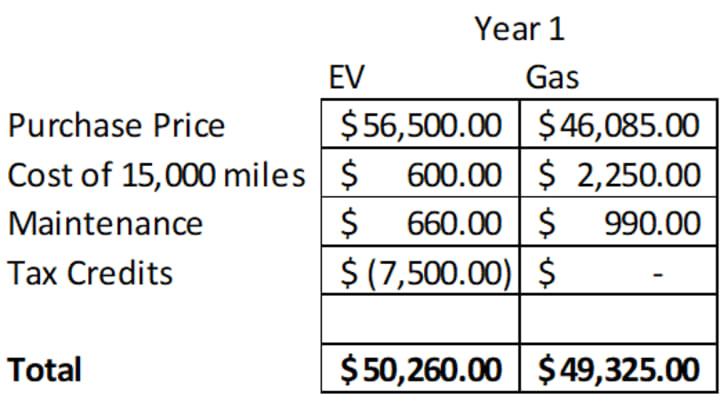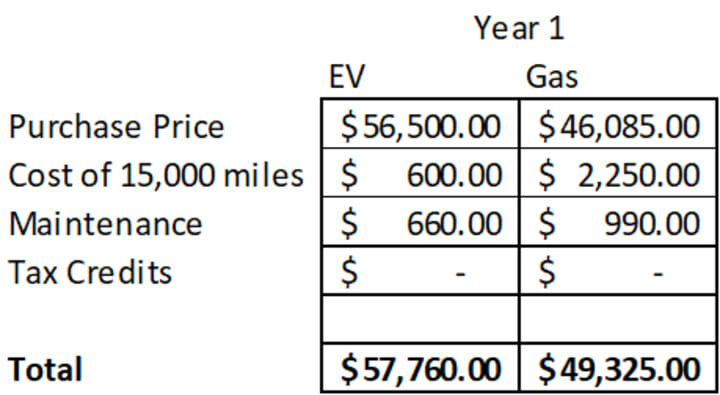Gas vs EV
Which is better for your wallet?

Gas prices are higher than your neighborhood street pharmacists best customer. As of this writing the average price per gallon is at $4.87. That and a quarter would buy you a footlong sub or a full meal at McDonalds in the 2008 financial crisis.
Yet today we’re facing all time high inflation, food shortages, formula shortages, sickness, supply chain issues, and on top of that what once fed us is now used to simply go to and from work. Forget the parts and labor if something on your vehicle breaks.
The price isn’t done rising yet. In fact, experts expect a surge in gas prices in the coming months. All the while those running the country are shouting “buy electric!”
But are they right? Is electric the solution or just another expense?
Its not a huge leap to assume most people think of Tesla when they think of EVs. While Tesla is by far the largest in terms of EV sales per year, is by no means the only EV automaker. Most large automotive companies such as Ford, BMW, Chevrolet, and Nissan have a line of electric vehicles.
Average Purchase Price
If the decision is finance driven, then to even consider purchasing an EV you should look at it as an investment. You put out a lot of money up front and hope it comes back to you and then some.
The average purchase price of an EV is about $56,500 vs $46,085 for a gas vehicle. That puts the average EV at $10,415 higher than a traditional vehicle.
In terms of gas prices, that’s about the cost of 2,139 gallons of gas. In those terms its going to take a minute to see any of that money back. But there’s more to it than that of course and we’ll get to that shortly.
Additionally, there are different EV’s to suite different lifestyles. For example, you can find a Nissan Leaf relatively easily for under $30,000 new or $15,000 or less used in many cases. However, its largely only good for shorter trips as the battery range tends to be less than about 120 miles per charge.
Contrarywise you can purchase a Porsche Taycan Turbo S Cross for around $188,000 if you want to get into the high end vehicles.
Charging Costs
Its tempting to ignore the cost of charging your vehicle when you plug in at home. I’m willing to wager that your utility bill doesn’t itemize your electricity usage to show what each appliance or room used in electricity. Still, there is a cost associated with charging your vehicle and it may fluctuate throughout any given day.
The cost of charging is going to vary from state to state, but you can get an idea of your costs at Energy.gov by using the eGallon tool.
On average you can expect about $0.03–0.04 per mile in terms of energy usage with an EV based on a $0.10–0.12 kWh.
Contrarywise gas vehicles are currently averaging $0.15 per mile with many seeing a much greater cost.
Although its not uncommon to find free charging stations, those which do impose a fee will usually be a bit more costly than charging at home. The average rate is around $0.43 per kWh which brings the cost of travel up to roughly $0.14 per mile.
Assuming you charge at home exclusively and you are like the average American who drives 15,000 miles per year then an EV would equate to roughly $1,650.00 annual savings for you or $137.50 per month.
Maintenance Costs
To put it simply, traditional gas vehicles have more things that can break due to more moving parts going into making the vehicle go. Electric vehicles don’t require motor oil and as such don’t require regular oil changes. Additionally, the regenerative braking which most EVs bring to the table today reduces the wear and tear on your brake pads and rotors.
On average the annual maintenance cost of an EV is roughly $330 per year lower than that of a gas-powered vehicle.
That equates to about $27.50 per month in savings on an EV.
Tax Credits
EV’s can be much more expensive upfront, but one benefit you may find is on the back end. Specifically, where taxes are involved. Keep in mind tax laws are always changing so do your research before buying and do not take this as tax advice.
That being said, electric and plug-in hybrid vehicles purchases are eligible to earn a tax credit for you. It’s a bit of a scale, as in not all get the max credit of $7,500, but its essentially a government dollar for dollar credit against your taxes.
What that means is this- if you buy a vehicle which earns you a $7,500 tax credit that is not an automatic refund of $7,500. It is a dollar-for-dollar reduction in federal income tax you owe. So if you paid in $10,000 in federal income tax and you were liable for $10,000 then your normal refund/balance due would be $0. After purchasing your EV your credit would then drop your tax liability by $7,500 from $10,000 to $2,500.
Which means that you paid in $10,000, were only liable for $2,500 and would thus get a refund of $7,500.
That being said in that same scenario if you paid $5,000 were only liable for $5,000 then credit would only reduce the $5,000 to $0. It would not roll over and your return would only be for $5,000, not the $7,500.
Depreciation
For the most part EVs do tend to depreciate faster than gas vehicles. Meaning gas vehicles tend to hold their value better. However, that largely depends on the vehicle.
One odd phenomenon I have witnessed personally is the prevalence of Tesla’s to retain or even increase in price on the used market. Specifically on Carvana I have seen 4+ year old tesla’s selling for the same or higher prices of the same vehicle new. While this makes no sense to me, its true.
So, all things considered depreciation differences seem negligible on a broad scale.
The Math
So how does an EV stack up as an investment? Lets do the math.

After one year the EV is going to cost about $935 more, assuming you get to enjoy the entire tax credit. That means that the following year you are saving roughly $1,980 on fuel cost and maintenance, bringing the total you’ve saved vs a gas vehicle to $1,045.
Maybe your taxes didn’t work out just right and you didn’t get to take any of that credit. That would mean that year one the EV cost an additional $8,435 over a comparable gas vehicle.

In that case it would take about 4 and a quarter years for your investment to break even assuming stable fuel prices.
What that means for you is that if you’re in this boat and need to save money on fuel, it will take you over four years to feel any of that savings by switching to an EV, and that’s with exclusively charging from home.
The Takeaway
Is an EV right for you? It depends on your situation. Is it the grand end all savior to those struggling with high gas prices? No, probably not.
An EV can be helpful if you navigate the waters wisely and do your research before jumping in on one, but another thing to keep in mind is that energy costs more at peak hours because that is when most people are using energy. With that in mind its logical to assume that if everyone begins to move to electric vehicles the energy prices will also rise.
About the Creator
Andrew Mark Holcomb
I've dealt with depression for a good portion of my life. I've tried a lot of things to help, but the one that seems to have the greatest long term impact is writing. I'm hoping some of my work can somehow help someone else too.





Comments
There are no comments for this story
Be the first to respond and start the conversation.